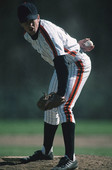
WEDNESDAY, June 9 (HealthDay News) — If you’re a baseball coach, you might want to find out whether your pitchers consider themselves to be morning larks or night owls, because a new study suggests that their sleep preferences may affect their performance.
The researchers found that people who say they’re at their best in the morning had a slight advantage in overall performance. But those morning types don’t perform as well at night as they do in the morning. And night owls seem to have an advantage at night games that just isn’t there when they play earlier games.
“We showed that there was a tendency for morning-type pitchers to pitch better in the morning, and evening pitchers did a little better at night,” explained study author Dr. W. Christopher Winter, medical director of the Martha Jefferson Hospital Sleep Medicine Center in Charlottesville, Va.
“Overall, M-type [morning] pitchers are better pitchers. From a baseball perspective, if you’re out scouting, someone who tells you that they’re a morning type may be a better prospect,” said Winter.
Winter was to present his findings Wednesday at SLEEP 2010, the annual meeting of the Associated Professional Sleep Societies in San Antonio.
Winter said the idea for this study came from previous work he had done looking at the effects of traveling across time zones on performance. That study found that teams traveling from West to East were more likely to win than teams who traveled from East to West.
The current study included 18 Major League Baseball pitchers from the Los Angeles Dodgers, New York Mets, Philadelphia Phillies, San Francisco Giants and Tampa Bay Rays.
The researchers determined through a questionnaire whether or not the pitchers were morning or evening persons, which is called a chronotype. Ten of the pitchers had an evening chronotype and eight had a morning chronotype.
Using player statistics from the 2009 season, the researchers analyzed 728 early innings and 845 late innings. Late games were those that started after 7 p.m.
For early games, the earned-run average (ERA) for morning-type pitchers was 3.11 compared to 3.49 for evening types. In night games, the evening types had better ERAs (4.07) compared to the morning types (4.11), the investigators found.
And although the study didn’t have enough pitchers to definitely conclude that morning types were better overall, the researchers said there was a trend towards morning-types pitching better overall.
“Sleep can really affect your health and performance,” said Dr. Carl Boethel, medical director of the Scott & White Sleep Institute in Temple, Texas. “What’s interesting about this study is, what are the implications for baseball? Will coaches test to see who’s a morning type? And will it affect the way managers and coaches schedule players?”
But, he added, this is a very small study, and there are a lot of variables that might have affected pitching performance, such as sleep quality and duration.
For people who aren’t Major League Baseball pitchers, this study also has implications. “How we gear things in terms of the quality of our work may be affected by the time of day. If you have to do an important presentation, try to gear the presentation toward the time of day you know you’re at your best,” Boethel suggested.
Winter said that he thinks many people “gravitate towards their chronotypes in their work without even thinking about it. I don’t know anyone in my medical school class who was a morning lark,” he said.
But, sometimes people do have to work against their chronotype and both Winter and Boethel said that sleep medicine doctors can help people make the adjustment, whether it’s temporary, such as for business travel, or permanent, such as for shift work. Using the sleep hormone melatonin, and bright lights, sleep doctors can help shift the times you enter certain phases of sleep.
More information
The National Sleep Foundation explains how much sleep you really need, and how you can try to work with your body’s sleep clock.

